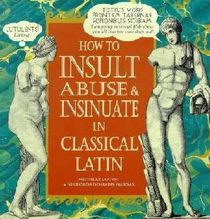Jennifer R. reviewed How to Insult, Abuse and Insinuate in Classical Latin on + 36 more book reviews
Helpful Score: 2
From the title, one might be misled into thinking that this book concentrates on building up the reader's vocabulary - learning to decline and conjugate new naughty words. In fact, the book is intended to give people the tools to 'make enemies and impress people' - language that while insulting is far from crude.
The book, in fact, consists of insults mined from classical literature - not just Juvenal's satire and Martial's scathing short poetry, but 12 other writers, including Cicero the politician and Petronius (author of the Satyricon). The authors admit right up front that they've taken everything out of context, and have taken liberties with the English translations accompanying the Latin originals to try to preserve the flavor - puns, double entendres, imagery.
After a short introduction, including a 2-page rundown of the original authors, the book is organized in 4 main sections.
"Insults for the" is broken into 10 'chapters'. "Witless" ("He hasn't got the brains of a sleeping two-year-old rocked in the crook of his father's arm"). "Clueless" ("Even if you had 10 tongues, you ought to hold them all"). "Worthless" ("Born to lounge around in naked sloth"). "Gormless"' best lines are from Cicero, while "Charmless"' are from Martial. "Legless" goes after drink & debauchery. "Sexless", while it doesn't need to use any obscenities in English translation, can't be quoted in a review. "Graceless" heaps on the physical insults ("Your face will always remain your own worst enemy"), "Malodorous" gets more specific. "Misogynist" doesn't insult women-haters, but provides ammunition ("How am I supposed to keep an eye on a woman who is always on the market?")
"Abuse" falls into only 3 categories: "Disreputable", "Insufferable", and "Indifferent". "Insinuations" has 4 subsections, for the "Venal", "Lecherous", "Treacherous", and "Murderous". (Martial, quoted under "Lecherous": "A woman who gets married *that* often doesn't get married: she just does the paperwork for her adultery.") Finally, the book wraps up with "Useful Threats."
The book, in fact, consists of insults mined from classical literature - not just Juvenal's satire and Martial's scathing short poetry, but 12 other writers, including Cicero the politician and Petronius (author of the Satyricon). The authors admit right up front that they've taken everything out of context, and have taken liberties with the English translations accompanying the Latin originals to try to preserve the flavor - puns, double entendres, imagery.
After a short introduction, including a 2-page rundown of the original authors, the book is organized in 4 main sections.
"Insults for the" is broken into 10 'chapters'. "Witless" ("He hasn't got the brains of a sleeping two-year-old rocked in the crook of his father's arm"). "Clueless" ("Even if you had 10 tongues, you ought to hold them all"). "Worthless" ("Born to lounge around in naked sloth"). "Gormless"' best lines are from Cicero, while "Charmless"' are from Martial. "Legless" goes after drink & debauchery. "Sexless", while it doesn't need to use any obscenities in English translation, can't be quoted in a review. "Graceless" heaps on the physical insults ("Your face will always remain your own worst enemy"), "Malodorous" gets more specific. "Misogynist" doesn't insult women-haters, but provides ammunition ("How am I supposed to keep an eye on a woman who is always on the market?")
"Abuse" falls into only 3 categories: "Disreputable", "Insufferable", and "Indifferent". "Insinuations" has 4 subsections, for the "Venal", "Lecherous", "Treacherous", and "Murderous". (Martial, quoted under "Lecherous": "A woman who gets married *that* often doesn't get married: she just does the paperwork for her adultery.") Finally, the book wraps up with "Useful Threats."




